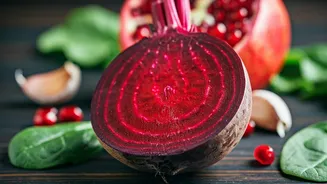Beetroot: Powerhouse for Circulation
Beetroot is a vibrant root vegetable known for its rich red color and impressive health benefits. It is packed with nitrates, which the body converts into
nitric oxide. Nitric oxide helps relax and widen blood vessels, which in turn improves blood flow and lowers blood pressure. Improved blood flow ensures that vital organs and muscles receive enough oxygen and nutrients, making beetroot an excellent food for circulation. The best way to consume beetroot is through juicing, roasting, or adding it to salads. Its versatility makes it a great addition to your regular meals, promoting overall cardiovascular health.
Berries: Antioxidant Richness
Berries such as strawberries, blueberries, and raspberries are loaded with antioxidants, particularly anthocyanins. These compounds protect blood vessels from damage caused by free radicals. This protective action is critical in reducing the risk of arterial stiffness and promoting healthy circulation. Additionally, berries contain fiber, which helps manage cholesterol levels. Eating a variety of berries offers a range of nutrients and flavors, making them a fantastic choice for supporting cardiovascular health. Incorporating a handful of berries into your daily breakfast, smoothies, or snacks is a simple yet effective way to boost your heart health.
Leafy Greens: Nutritional Powerhouses
Leafy green vegetables, including spinach, kale, and collard greens, are abundant in vitamins, minerals, and antioxidants essential for cardiovascular health. These greens are a great source of nitrates, which promote vasodilation, thus improving blood flow. Moreover, leafy greens contain vitamin K, crucial for blood clotting, which contributes to maintaining a healthy circulatory system. Adding these greens to your diet helps keep blood vessels flexible and efficient. They can be consumed raw in salads, steamed, or added to soups and stews. Consuming more leafy greens can have a significant effect on your heart health and overall well-being.
Garlic: Natural Blood Thinner
Garlic has long been recognized for its medicinal properties, including its ability to support cardiovascular health. Garlic contains allicin, a compound with potent antioxidant and anti-inflammatory effects. Allicin can help reduce the buildup of plaque in the arteries and lower blood pressure by relaxing blood vessels. Additionally, garlic has a mild blood-thinning effect, promoting smoother blood flow. Adding garlic to your diet can be as simple as adding it to your favourite dishes, such as soups, stews, and stir-fries. Eating raw garlic or using garlic supplements might offer enhanced benefits for heart health.
Citrus Fruits: Vitamin C Boost
Citrus fruits like oranges, grapefruits, and lemons are packed with vitamin C, a powerful antioxidant that protects blood vessels from damage. Vitamin C also aids in the production of collagen, a protein that strengthens blood vessels. Strong, healthy blood vessels are vital for proper blood circulation. These fruits also contain soluble fiber, which helps reduce cholesterol levels, further supporting heart health. Consuming citrus fruits daily provides a delicious and easy way to support your cardiovascular system. Enjoy them as a snack, add them to your water, or include them in your breakfast.













